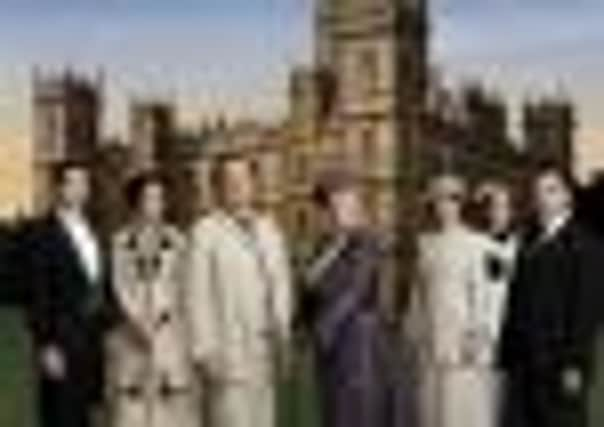Rules of life upstairs, downstairs and in my lady’s chamber


THE countdown is on for the return to our screens on Sunday night of Downton Abbey, ITV’s blockbusting period piece whose previous two series and Christmas special became event television the likes of which we hadn’t seen in any consistent way for many a long year,
The series, created and written by Oscar-winning screenwriter Julian Fellowes, follows the loves, losses, intrigues, feuds and upstairs-downstairs scandals of Lord Grantham and his family and staff at a time when the old Victorian order has started to fall apart, helped along by new Edwardian mores and the Great War, which altered society irrevocably. The jigsaw that made up the old order has been thrown into the air... and nothing has landed back where it used to be.
Advertisement
Hide AdAdvertisement
Hide AdIn the new series, set in 1920, the family has settled back into daily life and the Abbey is no longer a temporary hospital for injured officers. After many ups and downs and misunderstandings, eldest daughter Lady Mary Crawley is now happily (and handily) engaged to her cousin Matthew, who will inherit the Downton Estate.
No wedding in period drama ever comes off without at least a dozen mishaps, lovers’ tiffs and lots of hair-tossing, so I guess we don’t expect them to walk down the aisle until the very end of episode six.
Meanwhile, lady’s maid Anna is determined to prove that her new husband Bates, his Lordship’s former valet, is innocent of the murder of his first wife. And – can we take any more excitement? – the Dowager Countess of Grantham (the marvellous Maggie Smith) will meet her match in the shape of her son’s mother-in-law, Cincinnati millionairess Martha Levison, a woman who cares nothing for tradition and even less for class.
The enduring charm of a series like Downton, and indeed the return of Upstairs, Downstairs in recent years, is a mystery to some. But a large part of the allure is, surely, that these stories are based around a world within a world. Downton is a microcosm of society at large in its day,
Advertisement
Hide AdAdvertisement
Hide AdSuch series also bring to life a period we might have touched on very little in our school studies, except to understand the First World War.
Ruth Binney set out to bring social history to life with her book Wise Words and Country House Ways. The Bradford headmaster’s daughter went to live in Devon when her father was made headmaster of Blundells public school, She studied natural sciences at Cambridge, but has authored seven book of social history. She is fascinated by how life was lived in English country houses. Binney describes everything from etiquette at the dining table and when a lady should keep her gloves on, to the daily routines of the servants, the intricacies of the country house kitchen, and how the grounds, vegetable garden and poultry were looked after. For anyone who loves visiting our beautiful Yorkshire estates, it would make an entertaining read before your next outing, as it would definitely enhance the experience.
“I hate going to such houses and simply looking at rooms full of paintings with little information provided in the way of what happened in this room and no access either to where the servants lived and worked below stairs, “ says Binney. “You gain very little understanding of what life was like.”
Although servants worked hard in these big country piles, Binney says there were compensations. “Often they were secure for life in their job, they were embraced by the family and were also well looked after in terms of food and lodging.”
Advertisement
Hide AdAdvertisement
Hide AdIs there anything we should take on board from life in these country houses? “Well, I know they could take things to extremes, but I do like proper manners, especially at the dining table. We’ve lost a lot of that, I feel.”
Binney, who lives in Dorset now, persuaded her neighbour Julian Fellowes to write the forward to the book. He says one of the attractions of such portraits of life in Victorian and Edwardian country houses to modern day readers and TV viewers is the sense of self-contained completeness,
He adds: “...It was an arrangement that involved men and women from every background, who each had a crucial role to play in this complex machine. In fact, one of the most pleasing of the recent developments in our appreciation of the country house is that we have begun to see that these places were part of our shared history and not just the homes of the upper classes.”
Wise Words and Country House Ways is published by David and Charles, £9.99. To order call 01748 821122. Postage costs £2.85.